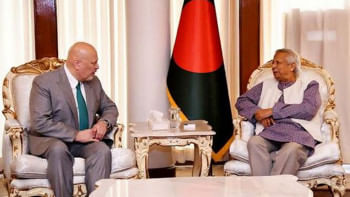Bangladesh ratifies WTO's trade facilitation deal
Bangladesh has ratified the trade facilitation agreement (TFA) of the WTO, which is likely to expedite the movement, release and clearance of goods, including goods in transit.
Bangladesh's WTO Ambassador Shameem Ahsan submitted the country's instrument of acceptance to Director-General of World Trade Organisation Roberto Azevedo on September 27, the WTO said on its website.
Bangladesh is the 94th member of the WTO and 12th least-developed country (LDC) to ratify the deal concluded at the WTO's 2013 Bali Ministerial Conference.
India approved it in April this year and became the 76th WTO member to accept the TFA. The TFA will take effect after getting a go-ahead from two-thirds or minimum 108 members of the WTO. After Bangladesh, another 14 countries have to approve the TFA to make it effective.
“Cross-border trade will be facilitated once TFA is implemented. Costs will also come down,” Khondaker Golam Moazzem, additional research director of the Centre for Policy Dialogue, a think tank, told The Daily Star.
Costs for cross-border trade -- exports and imports -- will go down because of the automation, documentation and harmonised system for charges, said Moazzem.
Accordingly, corruption and time for transportation will also be reduced, he said.The researcher said there are provisions for technical assistance and capacity building in this area.
The WTO said the TFA broke new ground for developing countries and LDCs in the way it will be implemented.
For the first time in WTO history, the requirement to implement the agreement was directly linked to the capacity of the country to do so. In addition, the agreement states that assistance and support should be provided to help them achieve that capacity.
A Trade Facilitation Agreement Facility was also created at the request of the developing and LDC members to help ensure that they receive the assistance needed to reap the full benefits of the TFA.
This will also support the ultimate goal of the full implementation of the new agreement by all members.
Also, on June 8 this year, the WTO hosted an experience-sharing event to help members identify best practices and the challenges faced by WTO members in establishing or maintaining national trade facilitation committees.
It was the first such event to discuss how best to implement specific commitments under the TFA.
The implementation of the TFA has the potential to increase global merchandise exports by up to $1 trillion per annum, according to the WTO's flagship World Trade Report released in October 2015.
The report also found that developing countries will benefit significantly from the TFA, capturing more than half of the available gains.
With the approval of the TFA, Bangladesh has also committed to carry out some specific responsibilities, such as determining when it will implement individual provisions of the agreement, said Moazzem of CPD.
“To benefit from special treatment, Bangladesh must categorise each provision of the agreement, as defined in TFA, and notify other WTO members of these categorisations in accordance with specific timelines outlined in the agreement,” he said.


 For all latest news, follow The Daily Star's Google News channel.
For all latest news, follow The Daily Star's Google News channel. 



Comments